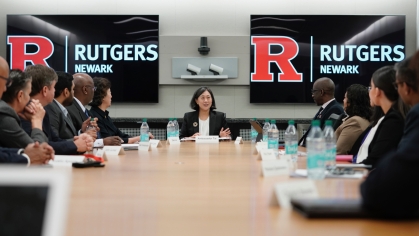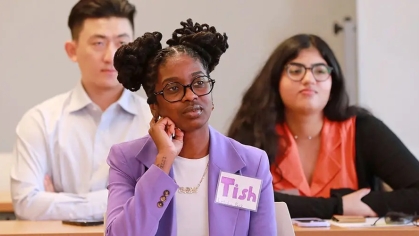Summer Program Gives High Schoolers Understanding of Supply Chain Management

Rutgers Business School’s summer Supply Chain Management program introduced 45 high school students from the Newark area to the world of forecasting, procurement, and logistics.
During the week-long program, the students – most rising juniors and most from historically underrepresented groups – also received an intensive day of training in Excel and spent a session with a group of African professionals participating in the Mandela Washington Fellowship at Rutgers.
After three days of lectures and workshops on forecasting, demand management, and strategic sourcing, the students learned about sustainable urban agriculture from Kevin Lyons, a professor of professional practice in supply chain management and director of Rutgers Business School’s Public Private Community Partnership Program.
Lyons told them how climate is impacting the environment and how the prevalence of food insecurity impacts many urban areas, and then he assigned them with a hackathon-styled project: Propose a plan for carrying out agriculture in Newark. The students were divided into teams and working side-by-side with the Mandela Fellows, they created plans for providing city residents with fresh food through sustainable supply chains.
In the span of an hour on large pieces of white boards, the students created business models incorporating such things as vertical farming in abandoned buildings, rooftop, and top floor farming in city high rises. Their plans included rainwater collection systems, electric vehicles for transporting fresh produce, volunteerism, pop-up markets, and cooking classes as a way of advocating healthy eating.
After the teams took turns presenting their ideas, Lyons reacted with a word: “Brilliant,” he told the class.
Karen Otavalo, who will begin her junior year at Newark’s Science Park High School after summer, said the program provided her with knowledge that she plans to apply in a club she runs at school that develops initiatives for public good. “This will help me with the club initiatives, and it will help me when I start developing my own business,” she said.
She said there were other benefits too. The professors gave them opportunities to develop their public speaking skills and network. “I met so many people,” Otavalo said, “from executives to new friends.”
John Impellizzeri, director of the undergraduate Supply Chain Management Department in Newark, said the high school summer program helps Rutgers Business School to create a pipeline of diverse student talent who want to study supply chain management. The program began in 2015. It was revived this year for the first time since 2020 when it was paused as a result of the pandemic.
“We want to educate students of how supply chain management works all around them every day,” Impellizzeri said. “They leave the program knowledgeable and sensitized to supply chain operations that they interact with all the time.
“The earlier in a student’s life that we can educate and inform them,” he said. “The better chance they will have at making the right decision for college and picking a major.”

Kevin Lyons, a professor of professional practice, teaches a session on sustainable urban agriculture during the program for high school students. Lyons also oversees the Mandela Washington Fellowship Program at Rutgers Business School. On the day of his lecture, the fellows attended the summer program, working alongside the high school students on a project.
Lyons told them how climate is impacting the environment and how the prevalence of food insecurity impacts many urban areas, and then he assigned them with a hackathon-styled project: Propose a plan for carrying out agriculture in Newark. The students were divided into teams and working side-by-side with the Mandela Fellows, they created plans for providing city residents with fresh food through sustainable supply chains.

A team of students in the summer supply chain program work alongside Etta Madete, one of the Mandela Washington Fellows who is an architect in Kenya and co-founder of a company that builds affordable housing.
In the span of an hour on large pieces of white boards, the students created business models incorporating such things as vertical farming in abandoned buildings, rooftop, and top floor farming in city high rises. Their plans included rainwater collection systems, electric vehicles for transporting fresh produce, volunteerism, pop-up markets, and cooking classes as a way of advocating healthy eating.


